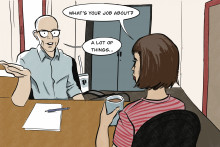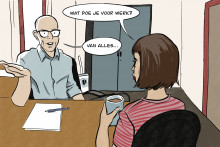His chair offers plenty of opportunities to do so. Hans focuses on a subject that is often discussed at drinks parties: efficiency improvement in healthcare. If you want to spill your guts about endless waiting lists, have a chat with him. Just don't expect him to give you his full approval if you argue for more hands on the beds or more money for healthcare. He sees little point in that. 'More money, more capacity in healthcare, it seems to be the panacea for all logistical problems. This year, billions more are going into healthcare, and the result is that people are not going to work differently: we are going to scale up the inefficiency.'
According to him, this can be done differently by using staff, rooms and equipment more intelligently and by better predicting the demand for care. In the end, fewer staff will be needed. The healthcare sector is very much occupied with extinguishing fires, running or standing still. We look at healthcare with a helicopter view and try to look ahead in time: how busy will it be in a few weeks' time?'

As an example Hans mentions the 'block schedule', a method for scheduling operating rooms. This schedule, which repeats itself weekly or fortnightly, specifies which speciality uses which operating theatres on which days. 'If the orthopaedists know that they will have five operating room days on Monday, the bed centre will also have all those patients on Monday. The block schedule determines how the flow of patients goes through the chain, but nobody knows yet how these schedules were ever created.' Because all the care steps are planned around the block schedules, blockages occur. 'Suppose they put a dam somewhere in the Rhine in Germany and let it fill up. Once a week, they throw it open and the whole mess comes to the Netherlands at once. Then you get floods - especially if they don't let us know when they're going to do it.'
According to the professor, by organising the schedules more intelligently, patients could flow through much more evenly, which would greatly reduce the workload. However, this requires a great deal of calculation, a well-oiled IT system and problem-free exchange of data between the various healthcare units. And that is the Achilles' heel of our healthcare system. Moreover, not everyone is keen on change. 'If you start interfering, you quickly end up in a very difficult discussion,' says Hans. 'They can always argue: we need more capacity, because look how many patients we have and how long they have to wait! The industry behind it - the producers of medical technology, the ICT, the pharmaceutical industry - also benefits from more money. It's a billion dollar industry and ordinary citizens have to pay for it.'
Nevertheless, Hans is optimistic about the future. 'You see that technology is becoming more pervasive, more and more of our alumni are working in hospitals. Look, conducting research leads to publications and prizes and congresses, that's all well and good, but this is where it happens. Here, students realise: oh, shit, this is also about me, as an elderly person I will also need care in the future. They become motivated to study this subject, to graduate and to apply their knowledge in practice. That is the most important thing I can achieve.'









